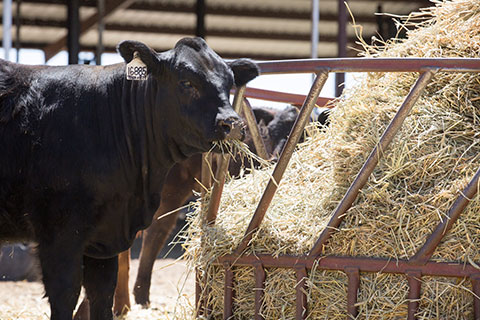Coordinating Board Opens Door for Innovative Veterinary College
The Texas Tech University System model will address Texas’ critical veterinarian shortages in the most efficient and cost-effective way.
July 21, 2015 | Contact Dailey Fuller
 During a meeting today (July 21), the Texas Higher Education Coordinating Board adopted
a new report reiterating the need for more large animal veterinarians in Texas and
recommending the consideration of a new veterinary college to address the state’s
specific veterinarian shortages.
During a meeting today (July 21), the Texas Higher Education Coordinating Board adopted
a new report reiterating the need for more large animal veterinarians in Texas and
recommending the consideration of a new veterinary college to address the state’s
specific veterinarian shortages.Chancellor Robert Duncan today (July 21) testified before the Texas Higher Education Coordinating Board (THECB), providing an update on the strategic plan of the Texas Tech University System and plans to develop a veterinary college.
The discussion supported the need for more large animal veterinarians throughout Texas and affirmed support of a new veterinary college purposely designed to address this need and to reduce the cost of education.
“There is no doubt that there is an existing and growing need for more food animal production veterinarians,” Duncan said. “This situation continues to worsen as Texas faces an aging veterinarian population coupled with more than one-third of its students leaving the state for veterinary medicine education. We are grateful for the Coordinating Board’s willingness to consider new approaches to address this critical need and look forward to sharing our unique vision for an innovative, cost-efficient veterinary college.”
A new report by the THECB, which was adopted at today’s meeting, reiterates critical shortages of large animal and rural veterinarians in Texas, as well as its implications on the food supply. Previous THECB reports published in 2002 and 2009 have identified similar concerns, and with the situation deteriorating, the 2016 report offers a new recommendation to address the problem and cites the Texas Tech University System’s plans to develop a new and innovative model.
“We are very encouraged by today’s discussion with the Coordinating Board and by the report and its recommendation to consider an innovative, cost-efficient veterinary college,” Duncan said. “As recommended in the report and mentioned at the meeting, this challenge requires an approach not constrained by traditional models, and the Texas Tech University System is uniquely positioned to provide this solution.”
According to the new report, the path to addressing the shortage of large animal veterinarians can be accomplished through “a proposal for a new college of veterinary medical education that is designed to specifically produce large animal veterinarians in an innovative, cost efficient manner that does not duplicate existing efforts.”
That reflects the model Duncan shared today with the THECB and the Texas Tech University System proposed in December when it announced the intention to develop a college of veterinary medicine with a doctoral program designed to train veterinarians to specifically address the shortage in rural communities.
Utilizing established strengths at two of its universities, Texas Tech University and the Texas Tech University Health Sciences Center, the Texas Tech University System is creating a program tailored to address a specific need as identified by the THECB’s multiple reports in a cost-efficient and innovative manner. The new college will enrich the practice of veterinary medicine by producing practice-ready veterinarians who serve and enhance the vibrancy of the rural communities important throughout Texas while at the same time intentionally reducing the cost of education.
About the Texas Tech University System
The Texas Tech University System is one of the top public university systems in Texas and the nation, consisting of
four component institutions – Texas Tech University, Texas Tech University Health Sciences Center, Angelo State University and Texas Tech University Health Sciences Center El Paso – and operating at more than a dozen academic sites and centers. Headquartered in
Lubbock, Texas, the TTU System has an annual operating budget of nearly $2 billion
and approximately 19,000 employees focused on advancing higher education, health care,
research and outreach.
In 2015, the TTU System’s endowment exceeded $1.1 billion, total research expenditures were more than $215 million and total enrollment was approximately 50,000 students. Whether it’s contributing billions of dollars annually in economic impact or being the only system in Texas to house an academic institution, law school and health-related institution at the same location, the TTU System continues to prove that anything is possible.

